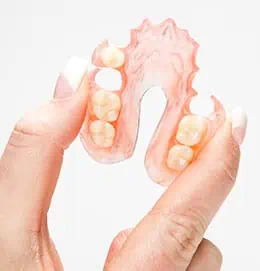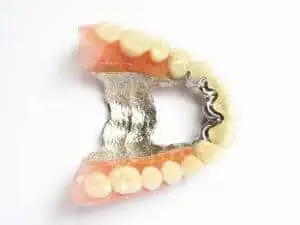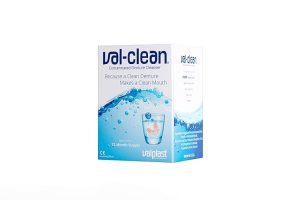Considering flexible dentures? Explore the advantages and drawbacks of flexible denture brands like Valplast in terms of aesthetics, comfort, and durability. This article compares flexible partial dentures to other false teeth types, provides reviews, and addresses key questions:
- How much do flexible dentures cost in the UK?
- Can you get flexible braces on the NHS?
- What is the Valplast dentures cost and are they the best brand?
- How long do flexible dentures last?
- How do you clean and look after your flexible dentures?
- What are some flexible dentures reviews?
We’ll also explain some other missing teeth options so you can figure out what’s best for you.
Get a free quote for dental treatment abroadWhat are Flexible Dentures?
Traditionally, dentures feature a metal or plastic base plate with acrylic gums and porcelain or acrylic fake teeth. Unlike flexible dentures traditional dentures are completely rigid and can be bulky to wear. But more recently, flexible dentures were created and became a new option to offer better comfort and aesthetics. Valplast were the first company to introduce flexible dentures, and they still dominate the UK market, so some people talk about ‘Valplast dentures‘ when really they mean any brand of flexible dentures.

But what exactly are flexible dentures, and how do they compare to traditional styles?
As the name suggests, flexible dentures are made from a thermoplastic resin material which allows them to bend slightly. Specifically, Valplast dentures and most other brands are made from nylon. This is biocompatible, meaning it won’t induce an allergic reaction.
The resin material is gum-coloured and translucent, which helps it blend well with the natural gums. False teeth are shaped and positioned to replace the patient’s missing teeth, and tooth-coloured clasps hook around existing teeth to hold the denture in place.
Flexible partial dentures vs traditional
For a long time dentures have been made from acrylic, sometimes combined with metal. This type is still widely available, and you can choose from different levels of quality. Here are some of the problems people can experience with acrylic dentures, especially the cheaper types:
- Can look artificial
- May have visible metal clasps
- Break easily
- Cause mouth sores if not a perfect fit
- May need denture adhesive to stay in place
- Can feel bulky in the mouth
On the plus side, they are quite affordable, available on the NHS, and simple to adjust if needed. You can also get immediate acrylic dentures after an extraction to fill any gaps on the same day.

Flexible dentures advantages
Flexible dentures address all of the potential problems mentioned above. They have no metal components and the lightweight resin material flexes to fit the exact contours of your mouth. This ensures a better and more comfortable fit.
Valplast dentures shouldn’t experience any deterioration through normal wear and tear, and they come with a lifetime guarantee.
Flexible dentures disadvantages
Flexible dentures are primarily designed for partial denture requirements, which might pose challenges for individuals seeking full dentures. Adjusting to changes in mouth shape due to ageing or additional tooth loss can be intricate with flexible dentures, potentially leading to expenses for adjustments or remakes, despite their durability.
Additionally, their relatively higher initial cost compared to acrylic makes them less likely to be available through the NHS.
Here’s a summary of the advantages and disadvantages of flexible dentures vs acrylic and metal:
Traditional | Flexible | |
Material | Metal and/or hard acrylic plastic | Thermoplastic resin, e.g. nylon |
Number of teeth | Any number, including a full mouth | Only a limited number (partial) |
Advantages | Affordable, available on NHS, can be adjusted easily | Comfortable fit, natural looking, very durable, biocompatible |
Disadvantages | Break easily, may not look natural, can be uncomfortable | Can be more expensive, rarely offered on the NHS, harder to alter |
How much do Flexible Dentures cost in the UK?

In the UK, flexible dentures cost between £400 and £600 as a starting price per arch. Some practices charge closer to £1,000 per arch, meaning you’ll pay around £2,000 for an upper and lower set.
Flexible denture costs depend on a number of factors including the dentist you go to, the brand they use, and how many teeth you need to replace. They are typically more expensive than basic acrylic dentures but more affordable than some premium options.
Semi-flexible full dentures cost a similar amount, again with prices varying according to the materials used.
Can you get flexible dentures on the NHS?
You cannot get flexible dentures on the NHS as standard, but they may be offered to patients who can’t wear traditional dentures, perhaps because of allergies or another reason. You’ll need to discuss this with your dentist; ultimately they will decide which type you are eligible for on the NHS.
Since NHS dental fees mean you’ll pay £200 to £300 for your dentures anyway, depending on where you live in the UK, you may decide it’s worth paying that bit extra for the benefits of flexible dentures.
Popular Flexible Denture brands
Valplast is by far the most popular brand of flexible partial denture in the UK, but some others you might come across are Flexite, TCS and SunFlex.
The cost of a Valplast denture in the UK is more affordable than some of the other ways to replace missing teeth. They cost on average between £400 to £600 per arch, but every practice is different and prices can range between dentists.
There is not a great deal of variation in terms of price and aesthetics between these flexible denture brands, but your dentist will explain why they recommend a particular brand and you can decide whether to go with their recommendation. One notable difference is that SunFlex offer combination metal and flexible dentures, so you can have a rigid frame with the softer base.
The video below shows what to expect if you get Valplast dentures in the UK, but the experience will be much the same whichever brand you choose:
Can you get flexible full dentures in the UK?
Flexible dentures are usually only offered as a partial denture, for people who still have some natural teeth. Flexible full dentures are available in the UK but not very common. However, there is a lot of innovation going on in this area, with companies developing better materials for different solutions.
How long do Flexible Dentures last?
There are a whole range of answers out there about how long flexible dentures will last. However the length of time your flexible dentures will last really depends on how well you care for them. Flexible dentures can last anywhere between 2 and 8 years when treated correctly.
They can last up to 8 years due to the durable materials they are made from, meaning they are less likely to break. So if you can avoid accidental damage they should last you a while.
Caring for Flexible Dentures
After forking out that much money, you’ll want to make sure you know how to clean dentures, and how to maintain them. Even if they have a lifetime guarantee, this is likely with the caveat that you clean them according to the manufacturer’s instructions.
One great thing about flexible dentures is that, unlike acrylic, they shouldn’t break if you drop them or sit on them or your toddler somehow gets hold of them. The main care instruction, then, is to use your dentist’s recommended flexible denture cleaner to clean your appliance every day. This prevents plaque build-up and staining, keeping your mouth healthy and your dentures good as new. Of course, you still need to brush and floss your teeth properly, too.

Val-Clean is the recommended Valplast denture cleaner. This box of Val-Clean contains a 12-month supply. Note that unlike other types of denture cleaning tablet, you make up a batch using 1/4 of a sachet and 250ml of water, and this can be used 7-10 times before needing to be replaced. This means that one sachet lasts around a month.
You can also buy this kit which contains a year’s supply of Val-Clean, a soft silicone toothbrush approved for cleaning flexible dentures, and a sonic denture cleaner.
Other cleaning products may be recommended for other brands, so check with your dentist. The following general rules also apply:
- Remove your denture before brushing your teeth, as it can be damaged by an abrasive toothpaste and toothbrush
- Hold it under running water to remove any food particles, or use a sonic cleaner
- Soak for 10-15 minutes daily, and overnight 3 times a week
- Keep it in water or cleaning solution when not wearing it
Flexible Denture Reviews
There are not many flexible dentures reviews to be found, aside from the anonymous reviews in different online forums. The reviews in the forums seem to all be quite positive, and many people claim that flexible dentures fit like a glove and are comfortable after one or two adjustments.
I’ve had one since January for one of my top front teeth and got on great with it. Easy to fit and clean, and looks very natural. It’s stable for eating and comfortable.
This commenter, who at the time of writing this review was still getting used to their denture, was extremely happy with it.
They don’t move and particles of food don’t get beneath the dentures. Can’t tell where dentures begin and own teeth end. Marvelous!
Another commenter has both upper and lower partial flexible dentures and is also very pleased with them. She says that she can now chew nuts on both sides of her mouth.
The next video is a review from a vlogger comparing acrylic and Valplast dentures. She has acrylic dentures, but has friends with flexible dentures and when she compares the two she seems to favour the idea of Valplast dentures.
In the review, this woman claims to prefer the Valplast dentures. Not only because they are much more comfortable, but because they are much more durable than acrylic dentures. But, she does mention that you have to clean them more carefully because they are more prone to bacteria buildup.
Other Tooth Replacement options
Dentures are usually the cheapest ways to replace missing teeth, but there are other options to consider. You may want a more permanent solution that isn’t removed for cleaning, for example a dental bridge, which is fixed to the adjacent teeth and can last 10 or more years.
The problem with both bridges and dentures is that they don’t replace the tooth root, and over time the jaw bone will deteriorate. Dental implants solve this problem, but they are also very expensive; the average dental implant in the UK costs £2,000 or more. For this reason, many Brits travel to get cheaper dental implants abroad.
Conclusion
Flexible dentures are made from a soft and, of course, flexible thermoplastic material. They are touted for their various benefits, like being more comfortable than normal dentures, being harder to break, and being suitable for people who are allergic to traditional denture materials.
As with any restorative dentistry solution, flexible dentures have disadvantages as well, namely their higher price and the fact that they can’t be adjusted as easily. Any kind of denture also has disadvantages compared to implants.
There does seem to be some quite good flexible dentures reviews from other denture wearers. But, ultimately, your dentist will be able to advise you if this is the best option for your oral health. You can also check some flexible dentures reviews to find out more about what it’s like wearing them.
FAQ’s
Can you get flexible full dentures?
Flexible dentures are usually only offered as a partial denture, for people who still have some natural teeth. Flexible full dentures are available in the UK but not very common.
How much do flexible dentures cost in the UK?
In the UK, flexible dentures cost between £400 and £600 as a starting price per arch. Some practices charge closer to £1,000 per arch, meaning you’ll pay around £2,000 for an upper and lower set.
Can you get flexible dentures on the NHS?
You cannot get flexible dentures on the NHS as standard, but they may be offered to patients who can’t wear traditional dentures, perhaps because of allergies or another reason.
What are flexible dentures?
Flexible dentures are comfortable, easy to clean, and look natural. Unlike traditional dentures with metal clasps or implants, they are thin, lightweight, and secured by invisible clasps around your natural teeth.
What are the cheapest flexible dentures in the UK?
There are a few flexible brace brands on the market in the UK however there is not a great deal of variation in terms of price and aesthetics between these brands, but your dentist will explain why they recommend a particular brand and you can decide whether to go with their recommendation.
How much does a full set of dentures cost in the UK?
Dentures in the UK can cost £500 to £3,000 for a full set. Prices vary based on materials, quality, and the complexity of the dentures.
ResearchGate: Flexible Dentures in Prosthodontics-An Overview. Consulted 29th February 2020.
IOSR Journal of Dental and Medical Sciences: A Review: Flexible Removable Partial Dentures. Consulted 25th June 2020.





